#OurCivilSociety
Published 25 October 2019
Applies to England
1. #OurCivilSociety - Reflections from Baroness Barran
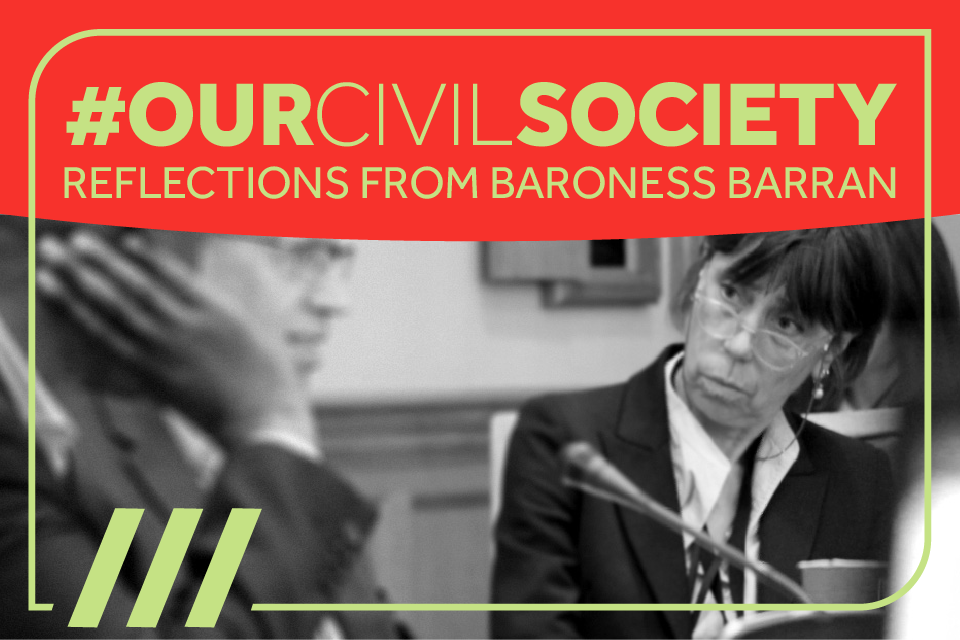
#OurCivilSociety; Reflections from Baroness Barran
Reaffirming the ties that bind us together
Our Civil Society represents the best of us. From supporting the most vulnerable and disadvantaged, to the work of community groups, charities, social investors and businesses that are committed to social good, the work of civil society is woven into the fabric of our nation.
As we approach a momentous time in the history of the United Kingdom, civil society has a crucial role to play in restoring a sense of pride, agency and confidence to individuals to create meaningful change in their own communities.
Published in August 2018, the Civil Society Strategy outlines a ten year vision for how government can work with and support civil society to improve lives and create a fairer society for all, described in the Strategy as creating ‘social value’.
Civil society includes any individual or organisation that works to create social value, independent of government. This definition is intentionally broad and flexible, capturing traditional charities, social enterprises (the social sector), active individuals, community groups, social investors and private businesses.
Over the past few weeks I have met remarkable people who are doing things in their communities - both small & large in scale - using people, relationships & technology to address local issues; these people need government’s support to further unleash their potential.
Government alone cannot create social value and solve the complex challenges facing society. But government can help to bring focus, unlock potential, and - where possible - convene, catalyse & fund activity to support people within communities who, together, can make a real difference. The Strategy is not intended as the final word or a fixed statement on government’s work in relation to civil society. On the contrary, it is the beginning of an ambitious, evolving work programme to help build a stronger society.
In line with the Prime Minister’s vision to “physically and literally” unite Britain, I have spent recent weeks reviewing the Civil Society Strategy, getting out to frontline organisations who are delivering grassroots engagement with those most in need, and meeting with people across the country to refine my approach to the future direction of civil society.
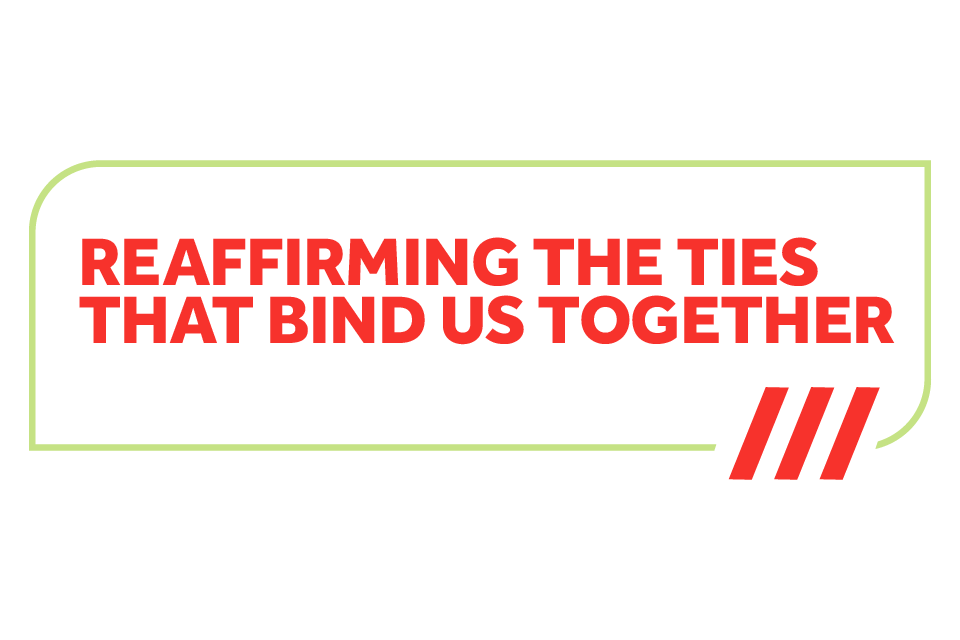
Reaffirming the ties that bind us together
With strides made since the publication of the Strategy, coupled with an acknowledgement that there remains more to be done, I want to set out my vision for the future and replay what I’ve heard through my engagement with the sector.
I hope my reflections on work to date, and work to come, can act as a catalyst to even more action across government and beyond, to continue to unleash the immense potential of #OurCivilSociety.
2. Civil Society Strategy Highlights
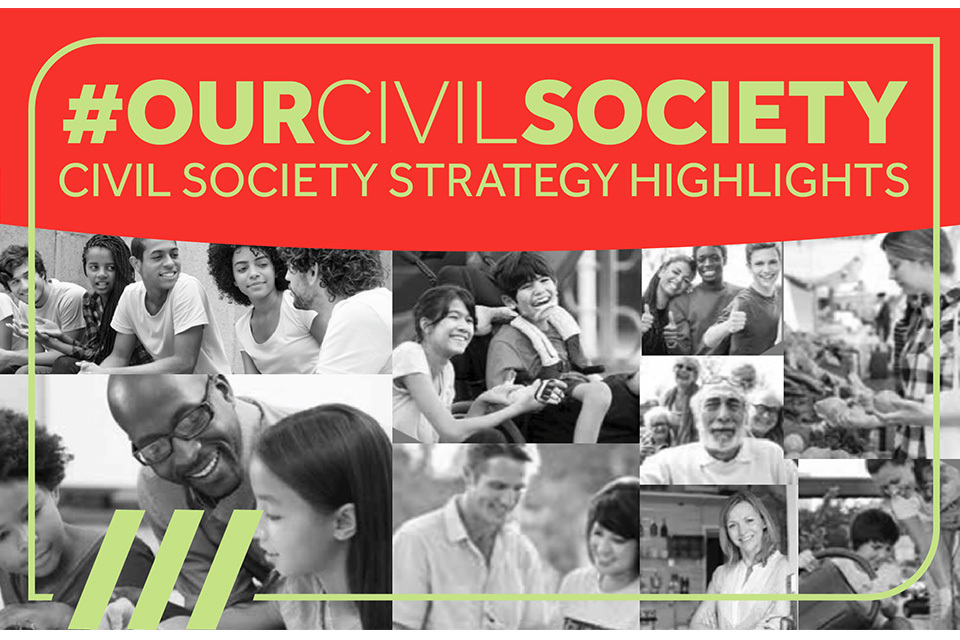
#OurCivilSociety; Civil Society Strategy Highlights
Over the last year, we have brought together people, charities, social enterprises and businesses to realise our vision to build a society that works for everyone.
We have given a voice to more people by:
- launching the Innovation in Democracy Programme with the Ministry for Housing, Communities and Local Government (MHCLG), with three local authorities trialling citizens assemblies to give local people a real say in the decisions that affect their everyday lives
- continuing our partnership with Nesta through the Centre for Social Action, which has mobilised the time and talents of 25,000 new volunteers (since 2017) to tackle the issues that are important to them and their communities, helping to support public services and improve social outcomes for more than 207,000 people
- training over 2,800 community organisers to reach out, listen and support local people to take action on issues that matter to them, since the Community Organisers Expansion Programme began in 2017
- listening to 900 people on average per month through grassroots Social Action Hubs
- supporting 10 cross-sector partnerships through the Place Based Social Action programme to start to deliver their community-led, local action plans to achieve ambitious social change in their areas
We have started a national conversation about loneliness across government and beyond by:
- publishing government’s first Loneliness Strategy in October 2018 and kickstarting its implementation
- starting the roll-out of social prescribing
- making 126 grants through the Building Connections Fund
- getting open data pilots underway to improve the way information about local services and activities can be easily accessed
- launching the #LetsTalkLoneliness campaign to help raise awareness of loneliness and tackle the stigma surrounding it
- providing £1 million for Tech to Connect, a challenge prize delivered by Nesta Challenges, encouraging charities, social enterprises and social tech ventures to build tech solutions to tackle loneliness
We have continued to invest in positive activities for young people to enable them to fulfil their potential and contribute to their communities through:
- continuing to deliver the NCS, with almost 100,000 young people in the past year alone benefitting from taking part in this youth programme that helps build a more responsible, more cohesive and more engaged society
- investing £5 million to create over 10,000 new places in uniformed youth groups such as Fire Cadets and Scouts, for young people in disadvantaged areas
- continuing to create new opportunities for young people to engage in volunteering and community engagement through the #iwill Fund - the £40 million joint investment between DCMS and National Lottery Community Fund
- investing in youth services and youth workers by renewing entry level qualifications, national occupational standards & curriculum and instituting a level 3 apprenticeship; as well as funding a £580,000 bursary scheme for students undertaking youth work qualifications
- setting up three youth voice pilot projects to enable young people to shape national policy, including a Youth Steering Group, Young Inspectors Group and a digital youth engagement project
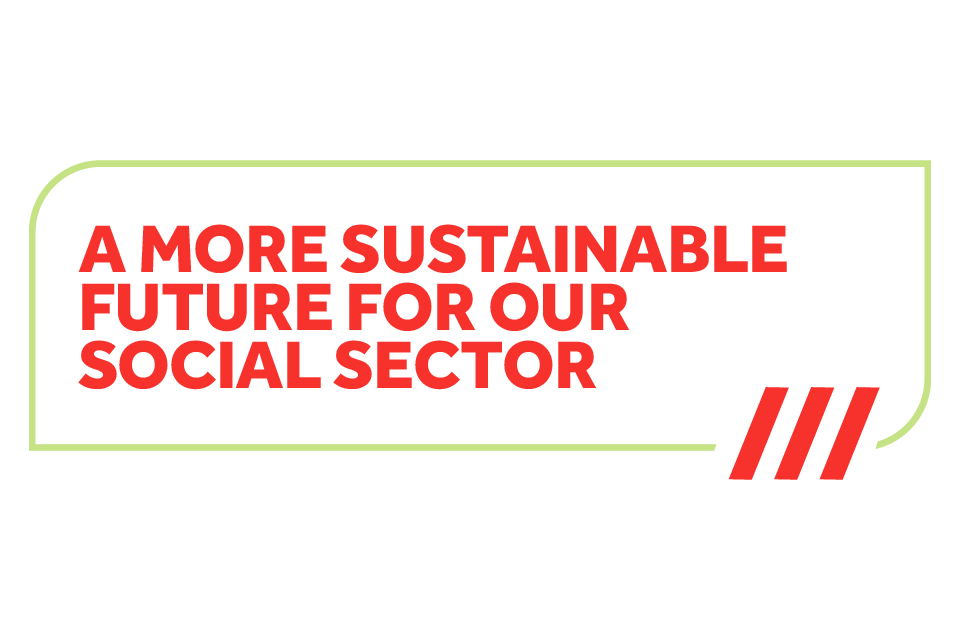
A more sustainable future for our social sector
We have continued to support a more sustainable future for our social sector by:
- partnering with local commissioners and VCSEs across the country, through the £80 million Life Chances Fund, to provide a wide range of services, helping to make the use of Social Impact Bonds (SIBs) mainstream
- match-funding £1.6 million towards The Catalyst, a go-to digital support network run by the Centre for Acceleration for Social Technology (CAST), which aims to support 40,000 charities to embrace digital over the next few years
- launching a £1 million Digital Leadership Fund, through which up to 1500 social sector leaders accessed vital digital skills training and encouragement to embed digital in their organisation’s strategy and values
- working with the Charity Commission and UK Community Foundations to so far release over £12 million from inactive charitable trusts to grassroots community organisations
- investing £1.1 million to increase awareness and capacity of charities in safeguarding, bullying, harassment and sexual harassment. This included £73,000 to fund ACEVO and the Centre for Mental Health’s report, In Plain Sight, which is helping charity leaders to tackle poor behaviour
- strengthening safeguarding in charities through the £1.2 million (joint-funded with The National Lottery Community Fund) Safeguarding Training Fund, such as new safeguarding resources on NCVO Knowhow, which includes a range of briefings, guides, practical tools, podcasts and videos
We have supported the set-up of new, independent organisations to deliver systemic interventions on social issues, such as:
- Fair4All Finance, which will use £55 million from dormant accounts to scale up ethical alternatives to predatory credit providers, increasing access to fair and affordable financial solutions for low-income consumers and;
- Youth Futures Foundation, which will use £90 million from dormant accounts to support the most disadvantaged young people into meaningful employment, helping to ensure that today’s generation of young people - whatever their background - are able to fulfil their potential
We have supported private sector organisations who want to partner with others to build a stronger society through:
- The Inclusive Economy Partnership (IEP), which brings together business, government, and civil society to work together on key social issues. In its first phase, the IEP has supported 18 social innovators to scale up, extending services to 50,000 people who would not have received them otherwise. It has also initiated ambitious partnership projects across its three challenge areas of mental health, financial inclusion and capability, and transition to work; such as the launch of Nationwide’s Open Banking for Good challenge into which they have invested over £3 million. It is now expanding to deliver further partnership projects, including an expansion of Movement to Work regional support on work placements into the North East and North West; and convening a group of 12 pathfinder employers who will be developing HR best practices for supporting employee wellbeing and managing employee performance
- supporting the establishment of the Impact Investing Institute, with the vision of improving people’s lives as more people choose to use their savings and investments to help solve social challenges as well as seeking a financial return
- supporting leaders in the private and financial services sector to come together to publish a detailed blueprint for the expansion of the dormant assets scheme, setting out the potential for expansion that could make hundreds of millions available for good causes over the next decade
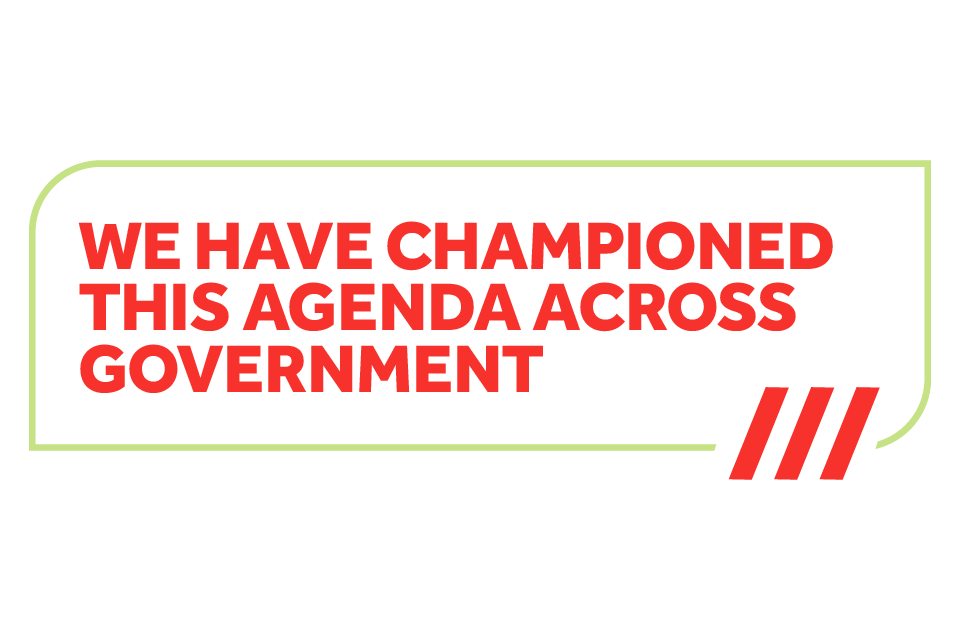
We have championed this agenda across government
We have championed this agenda across government, working with other departments to implement the vision of the Strategy, and recognising the work they are doing to take the agenda forward. This includes:
- collaborating with the Cabinet Office through the Inclusive Economy Partnership to bring together business, civil society, and government to work in partnership on solutions in three key challenge areas: mental health, financial inclusion, and transition to work
- working with the Voluntary Community and Social Enterprise (VCSE) Crown Representative to remove barriers for VCSE participation in public service markets. In 2018 we published an introductory guide to the Social Value Act for commissioners. We also published guidance for VCSEs to encourage them to sell to government or become part of the supply chain for delivering public services in 2019
- the Ministry for Housing, Communities and Local Government publishing a new communities framework, which articulates the department’s vision for stronger local communities. This document marked the next step of an ongoing conversation with communities and partners that will shape the department’s future activity, and was informed by consultation with civil society partners
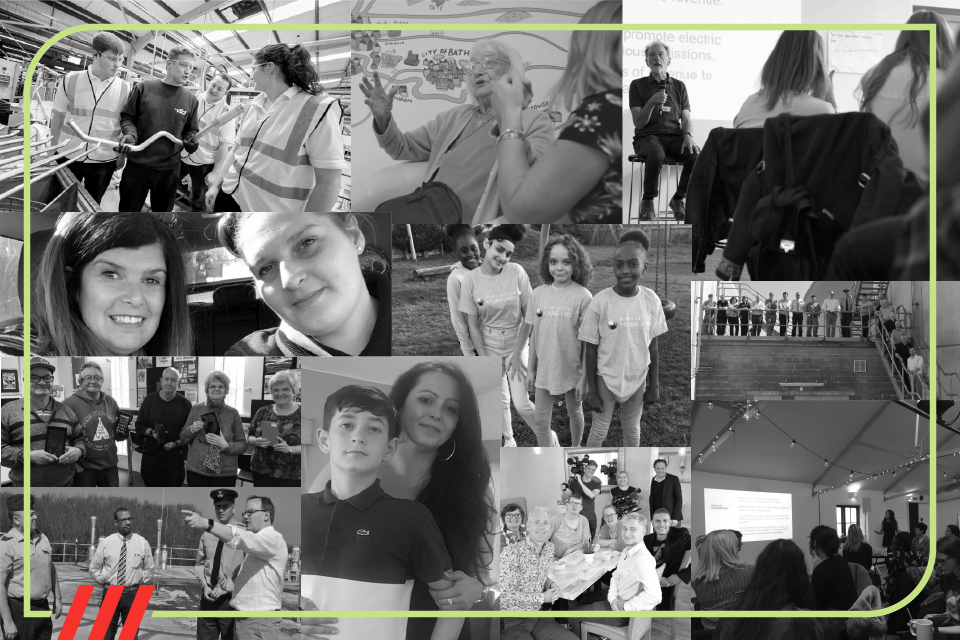
Link to shorthand
While these milestones represent strides forward in the delivery of the Civil Society Strategy, it is important to shine a light on the individual stories of people who have benefitted from our work with civil society.
3. Looking ahead - important themes and next steps
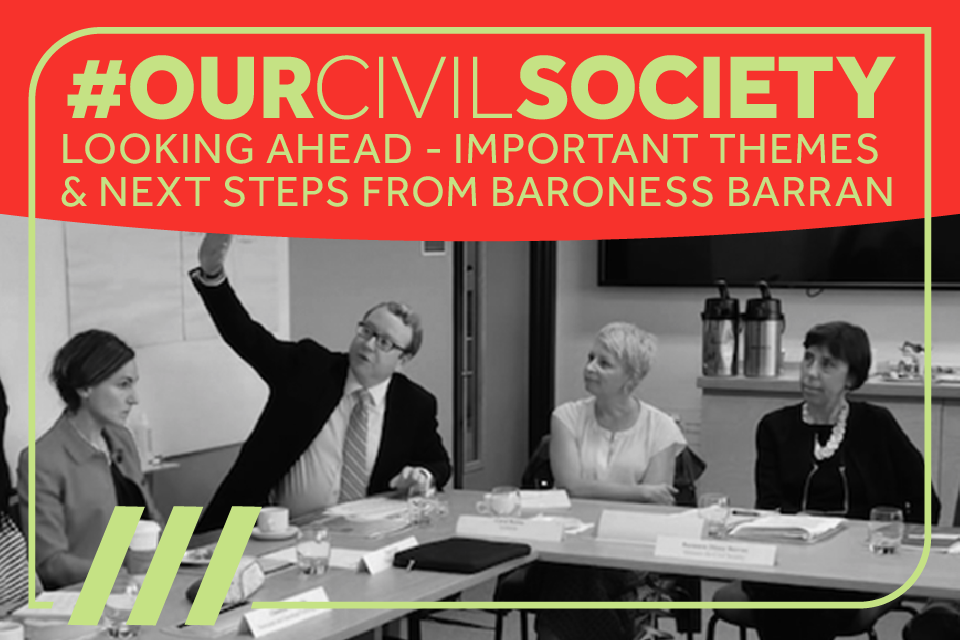
#OurCivilSociety; Looking ahead - Important themes and next steps from Baroness Barran
Our Civil Society is made of all organisations, people and businesses working, independent of government, to make our country a better place to live. From the community group helping people who are experiencing loneliness to young people getting involved in social action, civil society is about people and organisations who improve lives in our communities.
Having spoken to an initial range of stakeholders and reflecting on the Civil Society Strategy, Baroness Barran, Minister for Civil Society, has focused on three central themes:
- Building better connections between people in communities
- Ensuring all young people have opportunities to develop skills, networks and self confidence
- Supporting the social sector through an effective commissioning and funding environment
In connecting with the sector across a series of events held across the country over the past few weeks, the Minister asked attendees to focus on these themes, to help build out her understanding of the challenges and priorities they encapsulate. In the following video, Baroness Barran reflects on the challenges - as well as the opportunities - that came to the fore through the course of these events.
Watch Minister for Civil Society, Baroness Barran, reflect on the recent Civil Society Strategy roundtables and outline her priorities going forward.
#OurCivilSociety Reflections and looking ahead from Baroness Barran
I feel immensely lucky to have been involved with charities & the social sector throughout my career. As Minister for Civil Society, I’ve recently been around the country, hearing from a range of organisations across the sector (including over 70 amazing charities, social enterprises, businesses and social investors) about their work supporting our civil society strategy and discussing how we can further focus our shared priorities for the future.
By listening to the issues that are most important to organisations in the sector, in companionship with the Civil Society Strategy, I’ve channelled what I’ve heard into three key themes:- building better connections between people in communities; ensuring all young people have opportunities to develop skills, networks and self confidence; supporting the social sector through an effective commissioning and funding environment.
I hope that my reflections on these themes, and thoughts around how we keep on delivering progress against them, continue to cohere and reinforce government’s commitment to delivering against the Civil Society Strategy.
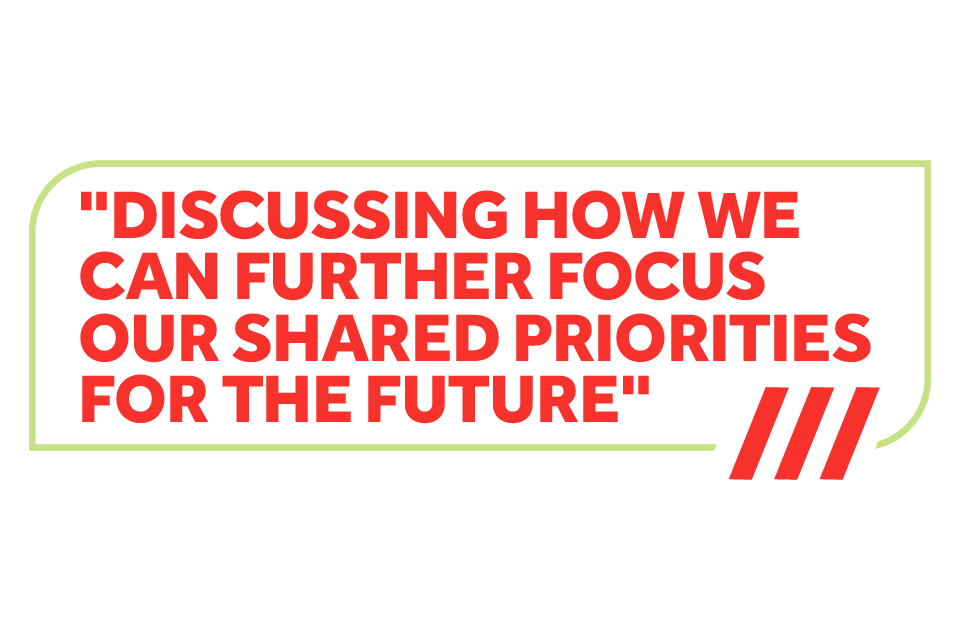
Discussing how we can further focus our shared priorities for the future
1. Building better connections between people in communities
What I heard:
- my fundamental reflection here is that the solutions to community challenges lie within the communities themselves
- the focus needs to be shifted from fixing problems that arise, to supporting people, organisations and communities to improve their capabilities - ensuring that as government we are supporting long-term relationships rather than short term transactions
- many of the people I’ve interacted with across the country are keen advocates for a place-based approach to building stronger connections between people. Place was one of the key pillars of the Civil Society Strategy and government has increasing focus on place-based policymaking
- there is a strong sense that citizens should be involved in decision-making, with their voices heard at each step in the process. They should have more power and influence over decisions that are being made in their local area
- building connections through the chain is therefore key - this means making sure, for example, that smaller grassroots efforts are linked into larger organisations, that community leaders from faith leaders to local organisers are connected, and that public service mutuals are positioned to play essential roles in delivering fundamental provisions for communities everywhere
- this also means reimagining community spaces, so that a church can host a cafe, or a library can offer wellbeing support to local people, and the people who can organise and connect these places and people have the tools and support to raise awareness around these community initiatives
Next steps:
- to help communities unlock spaces where people can connect and take action, we have launched the £1.6 million Space to Connect fund in partnership with the Co-op Foundation. The local spaces we’re funding will provide a home for a broad range of activities, from community cafes and lunch clubs, to art classes, keep fit sessions and community events
- to give people a say in local decision-making and, following the success of the citizens’ assembly in Greater Cambridge over the past month, the next assemblies in the Innovation in Democracy Programme will be held in Dudley and Romsey (Test Valley). These will focus on the future of their town centres. We have increased the reach, transparency and accountability of the assemblies through the use of online platforms for the wider community to be involved in the process
- to further enhance this drive toward connecting communities, I am hugely encouraged by the progress we are making around tackling the fundamental issue of loneliness
- we recently celebrated the first anniversary of government’s first loneliness strategy (see here for more details). We expect to publish the first annual report on loneliness by the end of 2019
- I recently announced £2 million of new government funding to support frontline, grassroots organisations that bring people together and help them build social connections. The funding will help organisations promote themselves more widely, make their activities accessible to more people, and bring established groups together to best serve local people at risk of loneliness. Details of the application process will be published soon
- we are working with cross-sector partnerships to create community-led change in 10 places across England through the Place Based Social Action programme. DCMS and the National Lottery Community Fund will continue to increase the capability of up to 10 places until 2025, helping them to make the change they wish to see in their communities
- I visited Barton Hill Settlement in September, which is one of 22 Social Action Hubs delivering the Community Organisers Expansion Programme (COEP). To support our grassroots, this programme will train 3,500 individuals in community organising across England by March 2020, bringing the total trained up to 10,000 since 2011
- furthermore, Access (the Foundation for Social Investment) has launched its ‘Local Access’ programme together with Big Society Capital. This programme will provide a blend of grant and repayable investment worth at least £33 million across five places in England. The first round of funding will be released to the chosen five places in early 2020, with the objective of the programme to support the growth of the social economy in local places, and in doing so help reduce poverty and inequality
2. Ensuring all young people have opportunities to develop skills, networks and resilience
What I heard:
- by placing youth voice at the centre of decision-making, we need to be brave in our approach to listening to young people
- we must ensure that young people are co-designing youth programmes, so that we are not only reaching those young people already engaged with the fantastic community activities already in place, but that we are extending our reach to all young people who could benefit from interaction with services that can build confidence, and help with the sense of citizenship that we want to foster
- in engaging both with youth-focused organisations & young people directly, I’ve heard numerous voices point out that in every community there should be accessible, high quality youth services that are sustainable
- these should be stigma free - no young person should miss out on these services because of their background, circumstances, or perception of the services on offer
- these should also allow scope for choice - accepting that a one size fits all solution doesn’t exist, and offering young people opportunities to participate in activities linked to sport, the arts, the environment & social action, among others
- in addition, many people emphasised that focusing on place is essential in the future of our offer to young people - not only vital physical places such as youth clubs and community centres - but digital spaces, in order to cast the net wider and reach a generation of digital natives that need our offer to be as accessible as possible
Next steps:
- DCMS is leading the development of government’s Youth Offer. As the cornerstone of this, the Chancellor recently announced a £500 million Youth Investment Fund, which includes plans for building more youth centres, refurbishing existing ones and delivering high quality youth services across the country. We will be working with young people and others to develop this fund over the coming months
- just this morning, Culture Secretary Nicky Morgan announced that youth projects across the country will receive a £12 million boost as part of government’s commitment to help young people thrive and level up opportunities. The investment includes up to £7 million for a Youth Accelerator Fund that will expand existing successful projects, and address urgent needs in the youth sector by delivering extra sessions in youth clubs, and promoting positive activities in sport and the arts to help young people develop skills and contribute to their communities
- a further £5 million of government funding will also be invested in the #iwill Fund to encourage 10 to 20 year olds to take part in social action, such as volunteering in their communities by funding groups delivering these programmes - Jointly funded by government and the National Lottery Community Fund, the #iwill Fund has created over 500,000 opportunities for young people since it was launched in 2016
- DCMS are reviewing the statutory guidance for the duty on local authorities to provide local youth services. A public call for evidence was opened on 3rd October and will remain open for 8 weeks. Following this call for evidence, updated guidance will be drafted and we aim to publish this in the spring (2020)
- the Youth Worker Bursary Fund will provide over £500,000 in bursaries to people undertaking youth work qualifications (this financial year). We will shortly announce the successful organisation who will administer the bursaries and work will begin in November 2019, with students selected and bursaries committed by the end of March 2020
- we have recommissioned the NCS Programme for a further 3-5 years, with a 30% saving in real terms over that period. We have also substantially expanded the supplier base for NCS, increasing the number of local youth providers involved in the programme
- as part of the work of our youth voice groups, we have been working with our Youth Steering Group to explore how we can digitally engage more young people in consultations and policy design
3. Supporting the social sector through an effective commissioning and funding environment
What I heard:
- we should continue to encourage an effective funding and commissioning environment to enable a sustainable social sector and help the next generation of public services to take form
- there is also a strong sense that smaller organisations must always be taken into account here - to make sure opportunities are not solely targeted to large businesses, but also SMEs and micro organisations
- stakeholders advised that the way we commission shouldn’t just focus on products and services, but should also take into account the potential for commissioning practices to nurture strong & diverse local supply chains
- over the course of the past few months I have heard a range of voices right across the social sector highlighting the need to take a long term approach to funding in order to be effective; stakeholders are telling me that rather than funding short term projects, we should fund long term outcomes
- I’ve also heard a lot of interest in social value, an area in which we are making huge progress
Next steps:
- jointly with the Cabinet Office, we are leading the programme to expand use of the Social Value Act in central government procurement, with an estimated £49 billion of expenditure per annum in scope
- from April next year, this means central government will be obliged to evaluate social value in tenders across every market in which government procures providing it does not add complexity or cost to the procurement process, restrict markets or exclude small businesses and VCSEs from government contracts
- in preparation, mandatory training for 4,000 commercial staff will commence in the new year
- we will shortly publish a ‘Guide to social value for public service leaders’. This will give practical advice and examples to leaders and decision makers in the public sector on why social value should be an essential consideration within all organisations, and how best to maximise the universal benefits of social value
- the £80 million Life Chances Fund (LCF) uses Social Impact Bonds (SIBs) to continue to drive financial innovation in the social sector via outcomes-based contracts
- projects include Kirklees Better Outcomes Partnership and West London Zone who are delivering two of the UK’s largest SIBs to date, comprising over £35 million of outcomes payment commitments to help support people experiencing homelessness and young people to improve wellbeing, confidence and academic achievement
- as the use of SIBs gains increasing traction, we are helping LCF applicants to launch a range of new exciting services to help vulnerable people in communities across the country. Among others, this will include programmes delivering transformational social prescribing, drug and alcohol misuse and social care interventions in contracts that will run up to 2024
- having visited Public Services Mutuals including Bevan Healthcare & Suffolk Libraries in recent weeks, I’m pleased that we are now in the process of considering responses to the Public Service Mutuals Consultation that was launched over summer & closed on the 18th October; there will be more to follow on this in the coming months
- we are representing the UK at the leading global forum for international exchange and collaboration in social entrepreneurship and social investment: the Social Enterprise World Forum. This will further support the UK’s excellence in the field of social enterprise, social value, Tech for Good, responsible business and social impact investment
- Social Enterprise Forum Launch - the Civil Society Strategy recognised the demand from the social enterprise sector for a simpler relationship with government and committed to establishing a regular forum for social enterprises to coordinate relations with government. Details of the forum will be set out in due course
- The Impact Investing Institute is launching formally in late November, with events in Sheffield and London. The Institute will convene key players to accelerate the growth and improve the effectiveness of the impact investing market, mobilising more capital contributing to solving social challenges. OCS is working collaboratively with the Institute to develop a much needed capacity and expertise facility to help local institutions, for example Local Authorities, access increased levels of private impact investment
- working with the Charity Commission and UK Community Foundations, we will have released over £20 million from inactive charitable trusts to grassroots community organisations by the end of the financial year 2019/2020
While all of this activity represents core themes for the Civil Society Strategy moving forward, it is key to note the breadth of other ongoing sector activity with imminent highlights, including the essential Safeguarding tools currently being deployed across the VCSE sector and the build up to the final Demo Day for Tech to Connect in March 2020, where 2 runners up and one finalist will be announced.
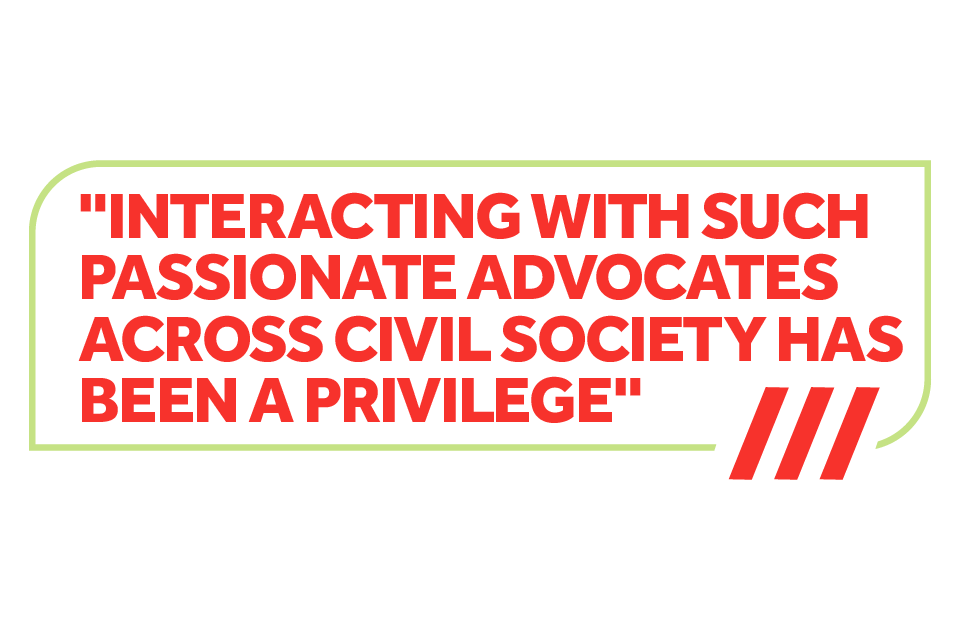
Interacting with such passionate advocates across civil society has been a privilege
Travelling the country and interacting with such passionate advocates across civil society has been a privilege, and one that has hugely clarified and channelled my vision for the Civil Society Strategy moving forward. For a sense of what was discussed at the roundtables, please see the video below which covers some highlights from the final digital roundtable, which was live-streamed on Facebook.
I understand that we cannot answer every question and overcome every challenge straight away, but this remains an ongoing conversation. I am determined to champion this agenda and Our Civil Society across government in order to achieve our shared mission to build a society that works for everyone.
I intend to continue to reach out to the sector both in person and digitally to remain close to the voices across civil society that need to be heard. I look forward to continuing the conversation with representatives of this brilliant sector to ensure the positive work of the Civil Society Strategy carries on.
